MIAMI, United States. – Cuban-American congressman Mario Díaz-Balart considered that a second administration of Donald Trump will increase pressure on dictatorships in the Western Hemisphere, which may not even survive another four years under the measures of the president-elect, as he stated.
“I have said multiple times that I do not believe that those dictatorships in the Western Hemisphere [Cuba, Venezuela y Nicaragua] “They would have survived another four years of Trump as president,” said the legislator in an exclusive interview with The Floridian.
Díaz-Balart emphasized that, during Trump’s first term, a carefully designed foreign policy was implemented that was beginning to “bear fruit.” “It was a fairly well-designed foreign policy… in essence, to help the national security interests of the United States,” he explained, referring to sanctions and aid provided to opposition forces in countries with authoritarian regimes.
The Florida representative also criticized President Joe Biden’s management in this area, arguing that the hard line towards authoritarian regimes weakened with his arrival. “When the Biden administration came, all that was wasted, lost, given away,” he lamented.
Looking ahead to Trump’s second term, Díaz-Balart was convinced that pressure will intensify. “I hope this second Trump administration will be as good, as aggressive, if not more so, toward America’s enemies around the world, but particularly in this hemisphere,” he said. “In Cuba, people are taking to the streets almost daily… and the regimes are responding with brutal repression. They have just murdered another political prisoner“, said.
The congressman also included Venezuela among the regimes that “are reeling” and warned that, with a solid foreign policy and national security team, the future Trump administration could leave these governments in a very vulnerable position. “I am convinced that with four years of Trump in the White House, these dictatorships are going to have a very difficult time sustaining themselves,” Díaz-Balart concluded.
Before his electoral victory on November 6, the campaign donald trump announced that, if elected president again, the Republican would have three demands for the Cuban regime.
As Jaime Florez, Communications Director of the Trump campaign, told the journalist in mid-July Mario J. Pentonof Martí News, Trump would ask the leadership of the Cuban Government to release the political prisoners, in the first instance.
“All political prisoners must be released immediately without any type of reluctance or condition,” Florez told Pentón, within the framework of the Republican National Convention, in Milwaukee.
The candidate’s spokesperson referred, secondly, to a call for free elections, with the participation of different political parties and with international observation.
Third, he added that Trump would demand that the regime stop “continuing to export its failed revolution to other Latin American countries.”
To the extent that these measures are met, he noted, relations between Cuba and the United States will be normalized.
Florez, spokesperson for the candidate, said that the issue of the embargo is also a total fallacy, since Cuba exports numerous products to the United States. “This story of the ‘blockade’ has to end,” he stressed.
In March of this year, the former US president already had pointed out that the leadership in Cuba could “be changed” if he was re-elected in November.
“I want to express my admiration and support for all the brave people of Cuba, who rise up against the vile communist regime,” Trump said in a video on his social network. Social Truth. “It is not easy and we appreciate it and it will change.”
“Under Cuba’s brutal and corrupt dictators, the Cuban people suffer terrible food shortages, power outages, poverty, political repression and religious persecution,” he added.
He also acknowledged that the country faces a lack of food, fuel and medicine. trump He said that he and his allies were closely monitoring the situation in Cuba and fully supporting the Cuban people.
Likewise, he asked the Cuban regime to hold “free and fair” elections.















